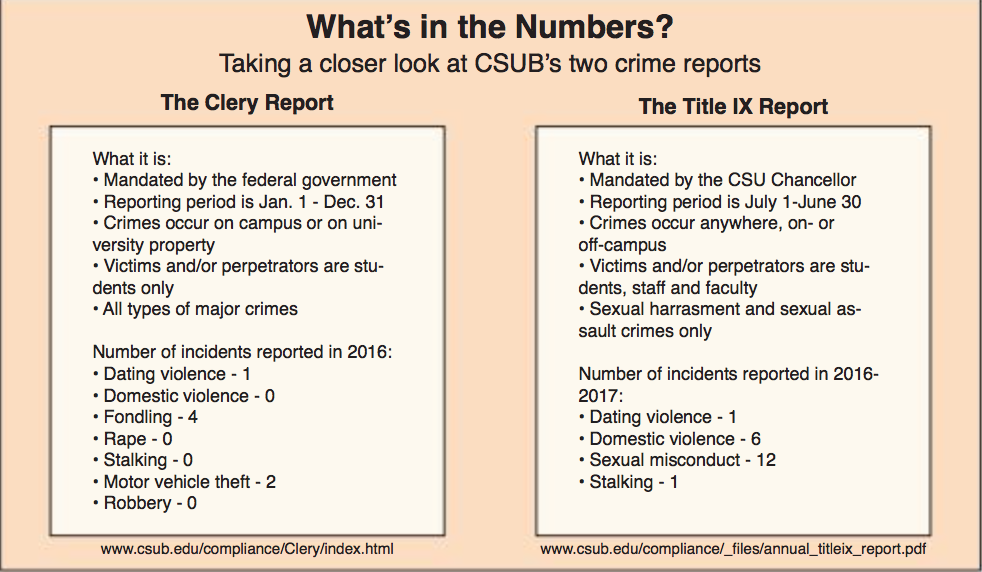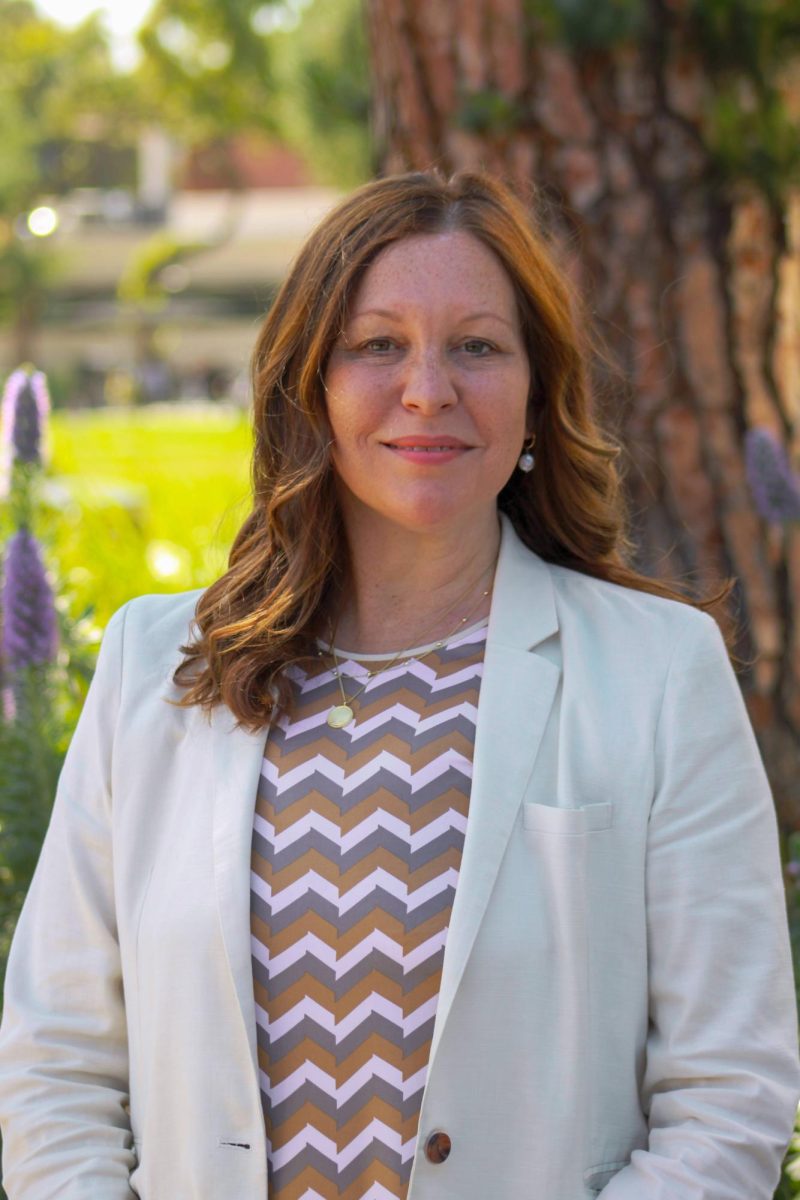By Runa Lemminn
News Editor
There are two separate reports that CSU Bakersfield students, faculty and staff can turn to regarding campus crime. One is called the Clery Report and is also referred to as the Annual Security Report. The other is the Title IX Report. While both reports show crimes affecting CSUB students, the similarity ends there.
The Clery Report is a federally mandated annual report on major crimes happening on any campus property nationwide, including any off-campus properties owned by each university.
The Title IX Report is a CSU Chancellor mandated annual report and covers all sexually related complaints concerning any CSU student or staff on or off campus property.
Neither report covers 100 percent of all crimes within its designated parameters, since not all crimes that happen are reported.
Also, the federal government and the California State University system have different methods of tracking crime numbers on university campuses.
Unfortunately, students are not always aware of these reports. They are also unaware of their options, should they become a victim of a crime.
Victoria Vandehoef, a junior majoring in kinesiology, said she didn’t know of any options as far as where to go get help on campus, except the police.
“I would just go to UPD,” said Vandehoef.
The Clery Report
The Clery Report is named after Jeane Clery, a 19-year-old college student, who was raped and murdered in her dorm room at Lehigh University by another student.
Her parents campaigned for years for the public to have a way to know if violent crimes were being committed on all college campuses. Finally, federal lawmakers passed the Clery Act, which mandates that every university and college in the United States publish an annual report on the crimes committed on campus.
This report does not contain every crime, however. The Clery only reflects serious crimes committed on university property. This includes any off-campus property, such as apartments owned by the university, or land.
Reportable crimes include murder, rape, motor vehicle theft, burglary, and arson. Other crime categories include liquor or weapons law arrests.
If a serious crime is committed by a student off campus property, it will not show up in the Clery.
When Clery reports are compared between campuses, it is important to know how much property each campus owns, as well as what overall percentage of students living on campus property. Crime numbers are greatly affected by these numbers.
CSUB has a small campus and currently does not own any off-campus properties. It also has a small percentage of students living in Student Housing, compared to many other CSUs in California.
Because of this the Clery crime numbers are extremely low for CSUB.
Numbers are compiled with data from several different offices at CSUB.
The report states “the ASR is prepared in collaboration with Student Housing and Residence Life, Office of Student Rights and Responsibilities, Human Resources, Office of the Provost, Student Affairs, and local law enforcement agencies.
Each department or entity provides updated information to UPD and the Office of the President for the University to comply with the Clery Act.”
Lieutenant Kenny Williams of CSUB’s university police compiles the numbers of cases that fall into every category. Williams said it’s a painstaking process, and involves a lot of double checking regarding if a crime is Clery reportable.
“We have a very good process for going through and complying with the Clery,” said Williams.
Before submitting the report, Williams and Claudia Catota, CSUB’s Title IX Coordinator, go over the numbers.
Catota and Williams both have decision-making authority regarding what goes into the Clery Report. When there are issues as far as how something should be classified, they can refer to the Clery handbook, which is provided as a guideline for university personnel to use.
“We may disagree, but it depends on what we see in the handbook,” said Catota.
The Title IX Report
CSUs are mandated by the Chancellor’s office to use a Title IX-related report. Catota said the purpose of the report was to get an idea of what was actually happening on campuses. The Chancellor wanted to see how campuses are responding to sexual misconduct and /or assault.
The Title IX Report is located under “Gender, Equity & Inclusion” of CSUB’s website, and is a record of all Title IX-related complaints (sexual harassment) committed against any CSUB student.
This category includes domestic violence, dating violence, and other sexual misconduct. The report also details what actions were taken to address the complaint.
The Title IX report only reflects the reports that the campus Title IX coordinator is aware of. So if a victim receives confidential counseling or treatment somewhere and chooses not to make the Title IX coordinator aware of the crime, it will not show up in the report.
Vanessa Corona, the CSUB campus advocate and education coordinator, is made aware of some sexual crimes involving students as well. However, because Corona’s service is confidential, Corona’s numbers are confidential. The only way an incident would be reported on the Title IX report is if that student wanted to move forward and report it to Catota.
“If a student directly comes over here, or Vanessa brings the student here, it would be reported,” said Catota.
For example, if a student is sexually assaulted at the Park at Riverwalk and reports the assault to Claudia Catota, CSUB’s Title IX coordinator, the assault will be on record. This is regardless of whether charges are pressed or the police get involved. It would not be on record for the Clery, however, since it happened off-campus.
Catota said if someone wants to file a report with the university, there is no statute of limitations as to when they can file.
Sometimes it can months after the incident before she hears about it.
“Some of the cases we get, they are not recent incidents, because people are still grappling with what happened,” said Catota.
Options for crime victims
Students have several options when they are targets of a crime on any CSU campus.
If it’s a Title IX related crime, even if the victim doesn’t feel strong enough to pursue charges immediately, the victim can get confidential counseling, as well as a rape kit to preserve any evidence. That way, even if the student waits for years to come forward, the evidence will be available.
There is currently no statute of limitations for reporting a rape in California.
“Coming from where it was that first year, we’ve seen definitely an increase in reporting. But I think a lot of it has to do with now we have people in place that students and faculty and staff can go to and report, or at least get options,” said Catota.
CSUB students are still not always aware of what their options are.
Susana Garcia, a sophomore biology major, said she didn’t know of any people or programs that she could contact, other than UPD.
“I would just call the campus police,” said Garcia.
The victim of a crime does not have to involve UPD or any police if they do not want to.







